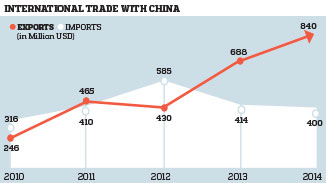Economy / Zimbabwe
In every crisis lies an opportunity
Zimbabwe’s economy has yet to match neighboring growth rates but early investors are already set to reap the future rewards

Shoppers are seen in a supermarket in Harare, while actions are being taken to fight inflation.
Earlier this year, 39-year-old Tawanda Taruvinga felt the consequences of the country’s current economic woes firsthand. Tawanda, a welder by trade, was among 20,000 workers to lose his job following the relaxation of labor laws designed to lower business costs across the economy. A father of four, he now sells pots in Siyaso, an informal trading area in southern Harare, joining millions of others in Zimbabwe without formal employment.
Tawanda was unlucky enough to work in the transport industry, a sector, like virtually every other in Zimbabwe that is suffering from chronic underinvestment. Crumbling roads and aging power stations make daily economic activity subject to power cuts and delays. Such problems are compounded by a financial system lacking the cash to fund projects to regenerate this decaying infrastructure. Zimbabwe’s financial markets, while stabilized after the introduction of the dollar in 2008, recently registered 18 percent of all loans as ‘non-performing’ and continues to be in the grip of a critical liquidity crunch. Without a sovereign currency and benchmark interest rates, inflation has been pulled down to negative levels, leaving the economy to suffer from low productivity, competitiveness and consumer demand.
Not all of Zimbabwe’s African neighbours have experienced the same economic misfortune. Both Angola and Ethiopia have averaged double-digit growth over the last ten years, and while Zimbabwe’s level of growth peaked at 10.6 percent in 2012, it has since flatlined at around 3 percent. As a resident of the world’s fastest growing continent, Zimbabwe’s economy over the last decade has grossly underachieved.
The country however has the resources and strategy to match these levels of growth in the years to come. Zimbabwe is home to enormous mineral deposits that include coal, copper, nickel, gold, iron ore and platinum. It has a quickly establishing and expanding communications and data sector, as well as an agricultural industry that exports include cotton and tobacco; positive indicators that are all supported by the fact that Zimbabwe’s labor force has one of the highest literacy rates in Africa.
According to Zimbabwe’s Finance Minster, Patrick Chinamasa, “The development of important infrastructure will form an effective base for growth.” Increasing the current output of energy is a priority: Power stations need to be expanded and built, as does the country’s transport network. Many of the 85,000 km of roads needs to be re-laid and the rail network requires an urgent upgrade. To ensure Zimbabwe finds the correct economic formula, the government has taken steps to ease business dealings and boost investor confidence: The controversial Indigenization Law has been relaxed to apply to just one sector and bureaucracy has been cut to quicken investment inquiries.

Many business leaders have not been deterred by recent economic forecasts, indeed some have already begun investing. Those that move early are likely to be first to take advantage of the expected long-term growth on offer. Africa’s richest businessman, Aliko Dangote, worth over $17.5billion has been one to look beyond the county’s current maladies and is investing in large cement and coal projects. As some deliberate on Zimbabwe’s direction, many are already investing, ready to reap the rewards.
